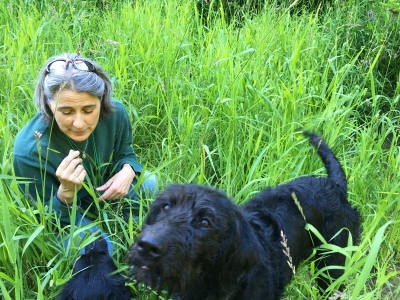
~ Delta Poetry Review ~
Martha Serpas, Featured Poet
 Martha
Serpas
has written four volumes of poetry, including
The Dirty Side of the Storm
and most recently Double
Effect. Her work has appeared in
The New Yorker,
The Nation,
Poetry, and
Southern Review and has
been anthologized in the Library of America's
American Religious Poems.
A native of Bayou Lafourche, Louisiana, she co-produced
Veins in the Gulf, a
documentary about land loss in the Barataria-Terrebonne Estuary. She
is a hospital trauma chaplain and a recent graduate of the Berkeley
Center for the Science of Psychedelics' psychedelic facilitation
program. She teaches at the University of Houston and co-directs
Scripts, the narrative and lyric health program at UH's Tilman J.
Fertitta Family College of Medicine.
Martha
Serpas
has written four volumes of poetry, including
The Dirty Side of the Storm
and most recently Double
Effect. Her work has appeared in
The New Yorker,
The Nation,
Poetry, and
Southern Review and has
been anthologized in the Library of America's
American Religious Poems.
A native of Bayou Lafourche, Louisiana, she co-produced
Veins in the Gulf, a
documentary about land loss in the Barataria-Terrebonne Estuary. She
is a hospital trauma chaplain and a recent graduate of the Berkeley
Center for the Science of Psychedelics' psychedelic facilitation
program. She teaches at the University of Houston and co-directs
Scripts, the narrative and lyric health program at UH's Tilman J.
Fertitta Family College of Medicine.
Had you never been with me,
I wouldn't hold your absence now—
Had there never been a cord,
I wouldn't have this scar, would I—
Maybe it was the whirlwind of your blood,
the amniotic undertow that had me so blazéd.
For you it must have felt
as if flesh were being plucked away…
A drift line, a double
heartbeat, a kerchief of hair—
In secret Betsy baptized me
into this strange sinful gulf.
I know this much:
Water is oak brown or steel gray
or so clear you see your nail beds
dipping in the fount. I've seen it rise in
ditches
or lap over levees or shank down
from the sky. It hems me in
like a country club towel.
What should I have grown up on, love?
(included in
Double Effect)
for Joy at the Baton Rouge Best Buy
Just call me
beb
Just lift more than one finger
off the steering wheel when we pass
each other in the 25, my having
assumed I could use your lane
to get around the cane truck,
and your grill smiling
like a wildcat coming on
Just call me
beb, like
when you put down my catfish
poboy, having told me
it was just filleted in the back
that morning and then
putting a lagniappe of two strips
in front of my friend who ordered
the Plate Lunch instead
Beb, it's reeeally good.
Sometimes joy has to be pushed
on me, like when I tried
to cancel my order online
and then had to call the store
and I got you Joy and you
called me
beb
and we talked
about computers and breast cancer
and that talk you had with God
on your way home from the Lowe's
parking lot where you got your scan
Just don't let me whine,
you said,
'cause
nobody likes a whiner,
and if God said anything, God said,
Beb, I liked you from the first.
It was the best thing that ever happened
to me,
you said.
I should call myself
beb
every day, and I
wonder, if I knew I was going to be reborn,
whether I wouldn't grieve extra hard
because there is Life and there is This Life,
and I would have to give up hope
for this one—hope that some further
saving possibility could be found here—
and wait to catch a warm front
and fly away to the next, well, then I might
be like you, Joy, listening for the rustle
of palmetto leaves in the dark
as I put my steps down on the path,
the
bebettes
harmonizing after the rain.
(included in Double Effect)
Né
– Décédé
We were seated around the Thanksgiving table—
turkey, stuffing, potatoes
au gratin—
eight or ten of us, when I noticed,
as I passed on the green beans and slivered
almonds, that they were all dead:
gelatin-eyed, orifice-oozing, putrefying dead.
I hadn't detected the strong smell above the
broccoli
casserole and
crusty Brown 'n Serve rolls.
I had been passing the wine, passing the water,
talking to myself about my affairs.
As their fingers lifted slightly from the table,
I laid coins on their eyes and kissed their brows.
I freed the dogs, who seemed warm, from their filthy pens.
One shouldn't look for the living among the dead.
Back at the farm where my father, dishes done,
moves a stick through ryegrass,
and a sharp-tailed snake heads for a thicket.
He wanders below Douglas firs and
smokes a Kool cigarette.
In the mornings I lie with him in the orchard and watch
the elk calves leap like static.
Sometimes a young bull. Mostly
cows clowning, distracting us while their cow
friends unlace liberty apples
from the lowest branches.
He hasn't aged. His nose is still broken
and his knuckles are a size too large.
For July his skin is burned patriot red,
and his eyes are green, green, green.
The hyphen between his dates is so tiny, carved
into the mausoleum's marble, it is a freckle,
half an ellipsis.
It's meant to pull the years one
on top the other. It's meant to erase
itself, like an iris wipe before The End.
On the farm I cut the grass with a push mower.
I try to save the wren's nest I dislodged
with the cane knife—his—
that I had been swinging through the brambles.
I nail new shingles on the porch steps when it rains.
Every morning I bring you tea in bed is his tomorrow.
The tray empty, the kettle and steam quiet,
the bricks fire-polished and weightless as they fall.
(included in The Diener)
Give me your Greek myths
and I'll give you the Carmen
Kief Bridge—forgotten,
whatever it was called before—
where thirty years ago Trey
scaled the steel lift
still hot from the sun of the day,
with a spray can under his chin
to inscribe the I-beam with the promise
of her memory and the imprimatur of his passion.
Or when Oris G.
did his girlfriend on the front lawn
at lunch—I was speechless with admiration.
The football coach looked him right in the eye
and Oris looked right back, the coach hardly
able to draw his smile or keep from pounding
Oris on the back as if he were a safety just
trotting off the field with his first
interception.
(What girl could
hold me—even under the bleachers?)
Trey sat with his brother on the T-top
of their Trans Am, a big wing-stretched
bird stamped in gold on the hood.
They drank the better of a twelve-pack
under the scrawl of a new constellation.
There was no moon, there was no call.
Mr. Kief went to early Mass
with his wife and four daughters,
auburn muses sliding into his car,
one hotter than the next, down to his baby girl
whose breasts even the straight girls attended.
Did Carmen see the blazón first or did her
father,
driving with his neck stretched as if
the crimson letters themselves were suitors
tearing up his sod and eating at his table?
Before the sun set, sandblasters were at work
clouding the message and marring the sword.
Fathers themselves, they scrubbed
the rust patches and rivets almost to clouds,
like those
around great mountain peaks, red rocks
and crags reaching through too-visible haze.
"Trey"
watered down to foam by the gritty spray,
"loves"
columned in faint streaks, but "Carmen" flaring
like the night it was born from Trey's nozzle.
All that Mr. Kief could not rid himself of:
how his baby became the protagonist,
how she acted through the actor, freeing
herself through photon bonding at the head
of this, our bayou infrastructure. Shame is such
a bastard, its fly-by-night parents,
cowardice and hubris—all that we know
better than God, all we hide from the grass
and the sky. Her name will be remembered,
not like a trophy or the blotted girl on the
lawn
but like a woman who guards the pass
or a woman who starts a war.
(included in
The Diener)
The warblers, vireos and thrushes fall out
their three-day spring-break drunk
into oak and
hackberry They've stopped to see
if the island is still dying and since it is
they continue on…
(Misplaced I too can be seen…)
Before I die a single live oak will catch
their exhaustion
They will cubby
like high-tops hung from the Loneliest
Road
in America
They will sing the LSU fight song
and take the 18-hour
flight
the red-eye
back to Cancún
(appeared in
Plume)
| Archive | Submissions | About | News |